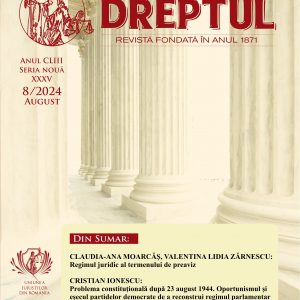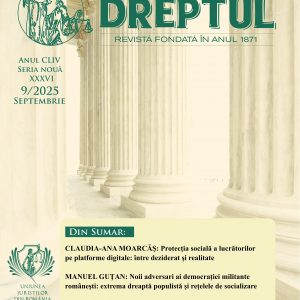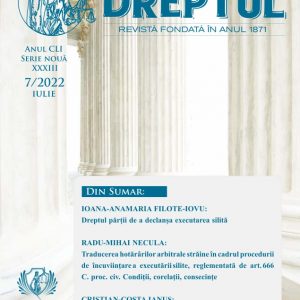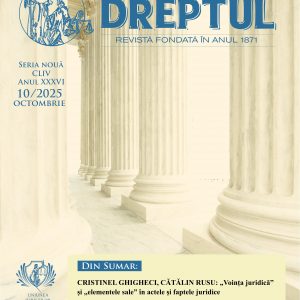În temeiul dispozițiilor art. 1 alin. (1), art. 8 alin. (1), art. 18 alin. (3) și art. 19 din Legea nr. 554/2004 1 , care reglementează regimul juridic al acțiunii în despăgubiri, revine
instanței de contencios administrativ să se pronunțe asupra dreptului la repararea pagubei cauzate, analizând condițiile de admisibilitate a cererii, inclusiv existența dreptului la reparație și modalitatea de acordare a acesteia.
Astfel, acțiunea având ca obiect repararea pagubei produse ca urmare a anulării unor acte administrative atrage, în raport cu aceste dispoziții legale, competența instanței de contencios administrativ, potrivit principiului general de drept conform căruia legea specială derogă de la legea generală.
„Specialia generalibus derogant” este un principiu juridic ce implică faptul că norma specială e cea care derogă de la norma generală și că norma specială este de strictă interpretare la cazul respectiv. Mai mult, o normă generală nu poate înlătura de la aplicare o normă specială. Fiind derogatorie de la norma generală, rezultă că norma specială se aplică ori de câte ori ne găsim în fața unui caz ce intră sub incidența prevederilor sale, deci norma specială se aplică prioritar față de norma generală, chiar și atunci când norma specială este mai veche decât norma generală.
Aplicarea principiului conform căruia legea specială derogă de la legea generală are ca efect înlăturarea dreptului comun de la aplicare. Așadar, incidența acestui principiu înlătură, totodată, posibilitatea coexistenței a două căi judiciare, una pe legea specială și cealaltă pe dreptul comun. (Î.C.C.J., s. a I-a civ., Dec. nr. 1016 din 2 iunie 2020, www.scj.ro)
 Din prevederile art. 34 alin. (1) din Legea nr. 165/2013, rezultă că în vederea soluționării dosarelor de despăgubire, legiuitorul a stabilit un termen de 60 de luni de la data intrării în vigoare a legii. Rezultă că formularea unei cereri înaintea expirării acestui termen este prematură. Această concluzie este întărită de dispozițiile art. 35 alin. (2), potrivit cărora în cazul în care entitatea învestită de lege nu soluționează decizia în termenele prevăzute la art. 33 și 34, persoana care se consideră îndreptățită se poate adresa instanței de judecată.” (Curtea de Apel Cluj, Secția I civilă, Decizia nr. 2776 din 10.12.2015)
Din prevederile art. 34 alin. (1) din Legea nr. 165/2013, rezultă că în vederea soluționării dosarelor de despăgubire, legiuitorul a stabilit un termen de 60 de luni de la data intrării în vigoare a legii. Rezultă că formularea unei cereri înaintea expirării acestui termen este prematură. Această concluzie este întărită de dispozițiile art. 35 alin. (2), potrivit cărora în cazul în care entitatea învestită de lege nu soluționează decizia în termenele prevăzute la art. 33 și 34, persoana care se consideră îndreptățită se poate adresa instanței de judecată.” (Curtea de Apel Cluj, Secția I civilă, Decizia nr. 2776 din 10.12.2015)







 În temeiul dispozițiilor art. 1 alin. (1), art. 8 alin. (1), art. 18 alin. (3) și art. 19 din Legea nr. 554/2004 1 , care reglementează regimul juridic al acțiunii în despăgubiri, revine instanței de contencios administrativ să se pronunțe asupra dreptului la repararea pagubei cauzate, analizând condițiile de admisibilitate a cererii, inclusiv existența dreptului la reparație și modalitatea de acordare a acesteia. Astfel, acțiunea având ca obiect repararea pagubei produse ca urmare a anulării unor acte administrative atrage, în raport cu aceste dispoziții legale, competența instanței de contencios administrativ, potrivit principiului general de drept conform căruia legea specială derogă de la legea generală. „Specialia generalibus derogant” este un principiu juridic ce implică faptul că norma specială e cea care derogă de la norma generală și că norma specială este de strictă interpretare la cazul respectiv. Mai mult, o normă generală nu poate înlătura de la aplicare o normă specială. Fiind derogatorie de la norma generală, rezultă că norma specială se aplică ori de câte ori ne găsim în fața unui caz ce intră sub incidența prevederilor sale, deci norma specială se aplică prioritar față de norma generală, chiar și atunci când norma specială este mai veche decât norma generală. Aplicarea principiului conform căruia legea specială derogă de la legea generală are ca efect înlăturarea dreptului comun de la aplicare. Așadar, incidența acestui principiu înlătură, totodată, posibilitatea coexistenței a două căi judiciare, una pe legea specială și cealaltă pe dreptul comun. (Î.C.C.J., s. a I-a civ., Dec. nr. 1016 din 2 iunie 2020, www.scj.ro)
În temeiul dispozițiilor art. 1 alin. (1), art. 8 alin. (1), art. 18 alin. (3) și art. 19 din Legea nr. 554/2004 1 , care reglementează regimul juridic al acțiunii în despăgubiri, revine instanței de contencios administrativ să se pronunțe asupra dreptului la repararea pagubei cauzate, analizând condițiile de admisibilitate a cererii, inclusiv existența dreptului la reparație și modalitatea de acordare a acesteia. Astfel, acțiunea având ca obiect repararea pagubei produse ca urmare a anulării unor acte administrative atrage, în raport cu aceste dispoziții legale, competența instanței de contencios administrativ, potrivit principiului general de drept conform căruia legea specială derogă de la legea generală. „Specialia generalibus derogant” este un principiu juridic ce implică faptul că norma specială e cea care derogă de la norma generală și că norma specială este de strictă interpretare la cazul respectiv. Mai mult, o normă generală nu poate înlătura de la aplicare o normă specială. Fiind derogatorie de la norma generală, rezultă că norma specială se aplică ori de câte ori ne găsim în fața unui caz ce intră sub incidența prevederilor sale, deci norma specială se aplică prioritar față de norma generală, chiar și atunci când norma specială este mai veche decât norma generală. Aplicarea principiului conform căruia legea specială derogă de la legea generală are ca efect înlăturarea dreptului comun de la aplicare. Așadar, incidența acestui principiu înlătură, totodată, posibilitatea coexistenței a două căi judiciare, una pe legea specială și cealaltă pe dreptul comun. (Î.C.C.J., s. a I-a civ., Dec. nr. 1016 din 2 iunie 2020, www.scj.ro)

